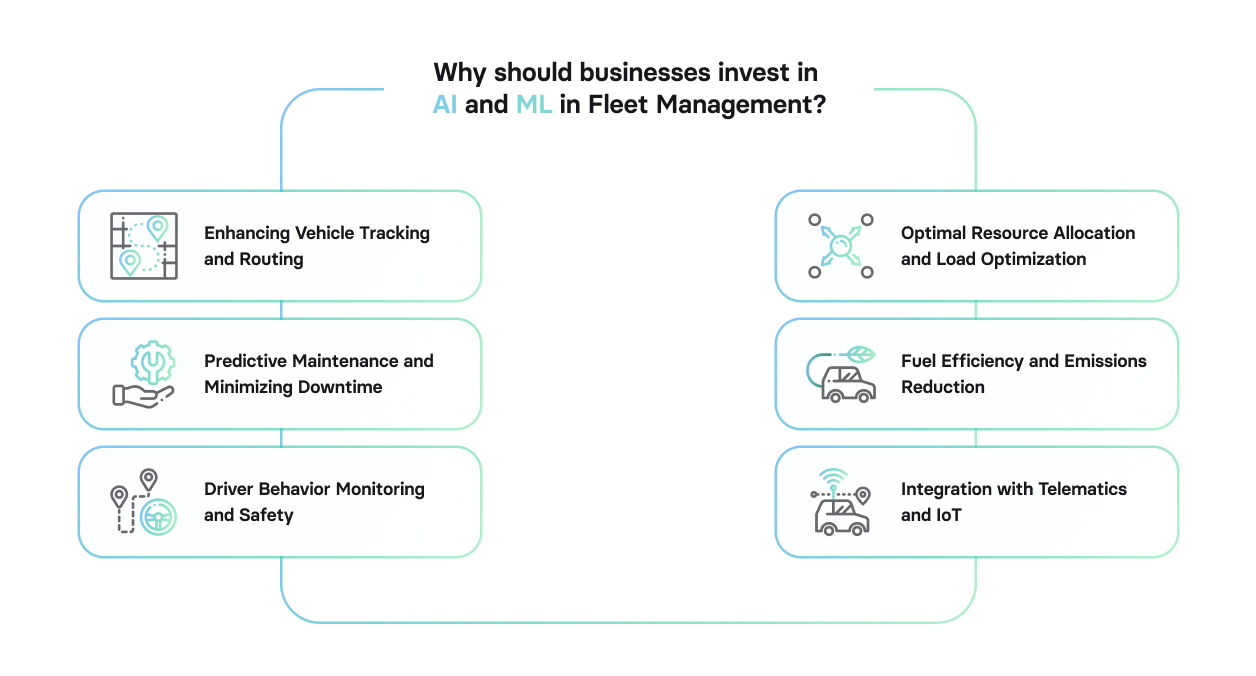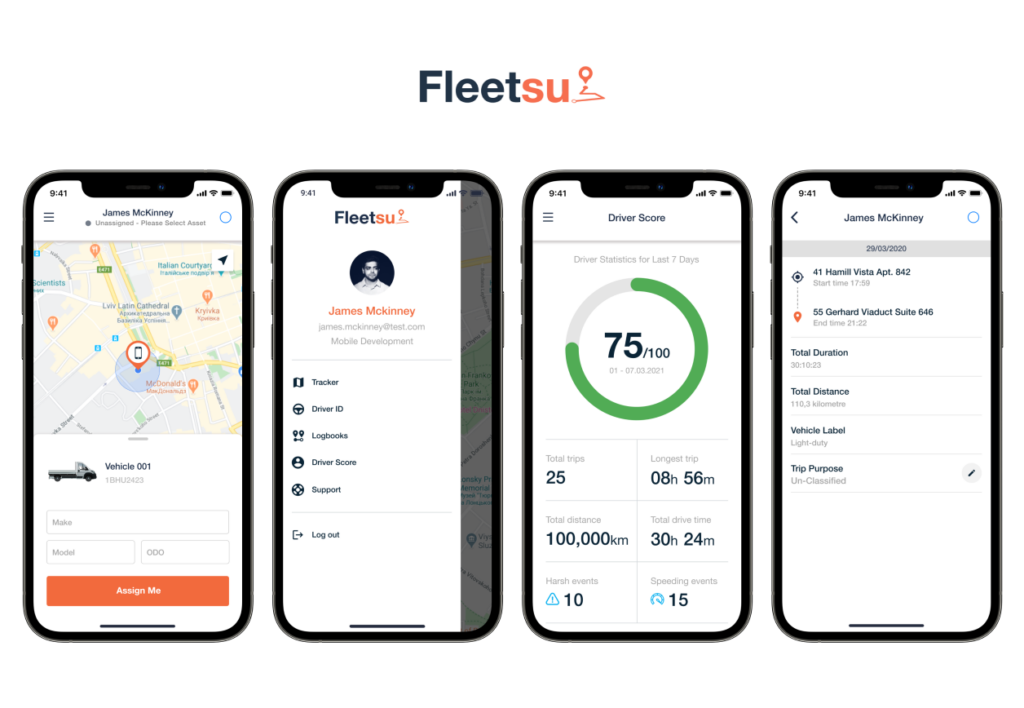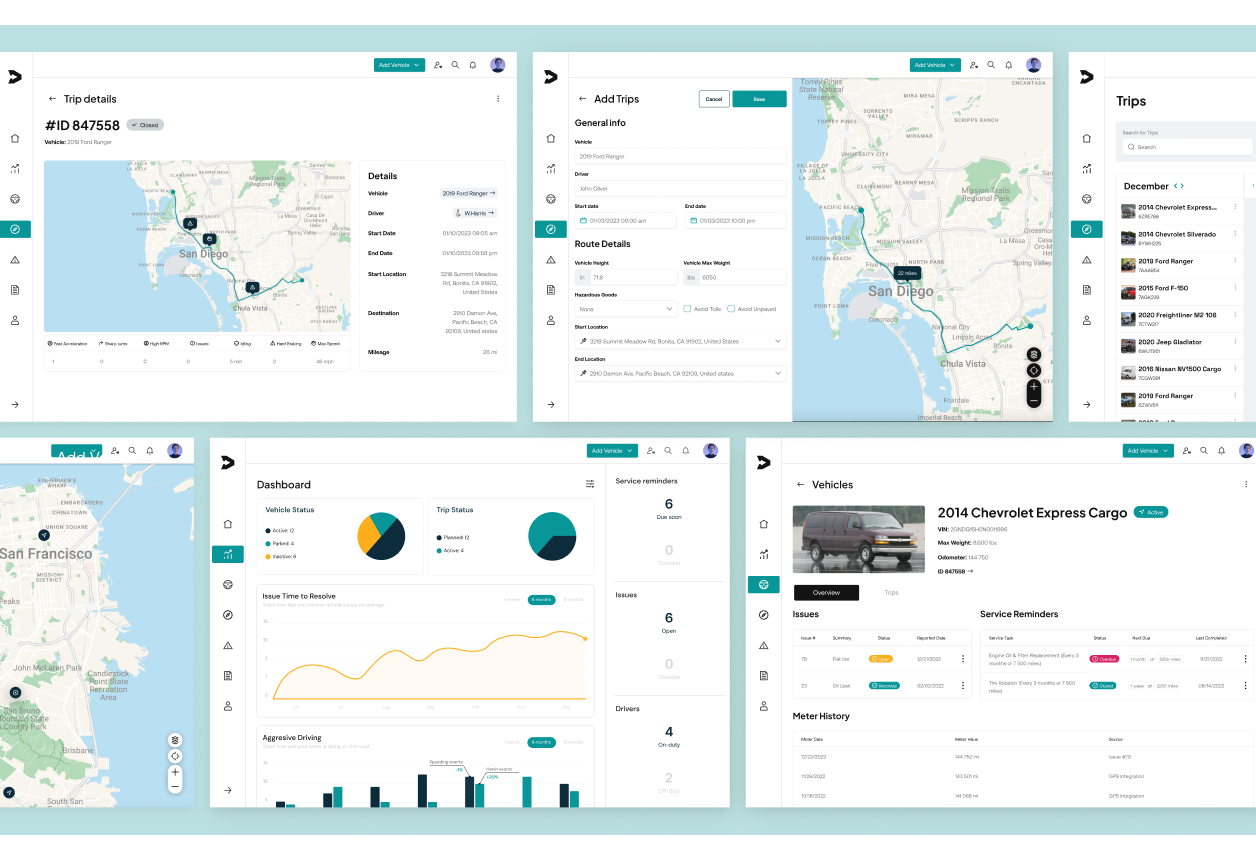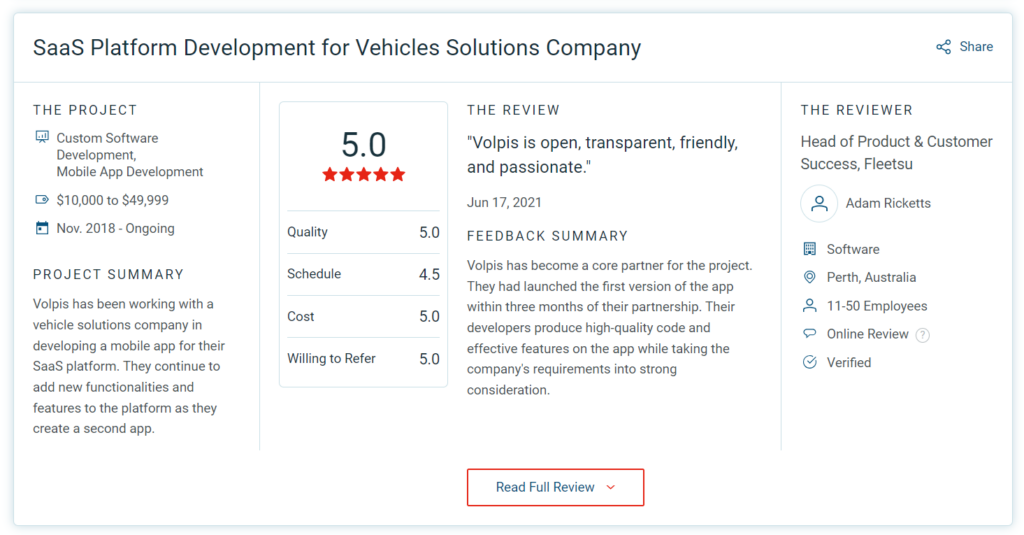Are you wondering how to effectively implement AI and ML in fleet management within your business operations?
Artificial intelligence (AI) and machine learning (ML) are revolutionizing how organizations operate and maintain their vehicle fleets. With the ability to analyze vast amounts of data, these technologies offer unprecedented opportunities to enhance efficiency, improve safety, reduce costs, and contribute to a sustainable future.
So, what exactly is artificial intelligence in fleet management?
Artificial intelligence in fleet management systems refers to the use of specialized algorithms and techniques that enable machines or software to simulate human intelligence and perform tasks that typically require human intervention or decision-making. AI technologies in fleet management systems are designed to analyze complex data, learn from patterns and trends, make autonomous decisions, and improve operational efficiency.
And what is machine learning in fleet management?
Machine learning in fleet management systems refers to using algorithms and models that can learn from data and make predictions or decisions without being explicitly programmed. ML algorithms analyze large volumes of historical and real-time data collected from various sources within the fleet management ecosystem to identify patterns, extract insights, and make informed predictions.
AI encompasses the broad usage of specialized algorithms and techniques to simulate human intelligence and perform decision-making tasks, while ML is a specific subset of AI that involves algorithms learning from data to make predictions. In the world of managing vehicle fleets, think of AI as a smart assistant that can make decisions and do tasks like a human. ML is like a special skill that this assistant has, like noticing patterns from past data to predict what might happen in the future.
In this article, we’re going to explore the multitude of benefits that businesses can reap from implementing AI and ML in their fleet management strategies. Additionally, we will delve into real-world case studies showcasing the transformative impact of these technologies.
And if you’re looking to harness the power of AI and ML in your fleet management, consider partnering with a custom fleet management software development company like ours. Our team specializes in tailoring solutions to meet your unique business needs, ensuring optimal efficiency and cost savings.
Why should businesses invest in AI and ML in fleet management?

Let’s examine how AI and ML can catalyze unprecedented levels of operational efficiency, cost savings, and safety enhancements.
1) Enhancing vehicle tracking and routing
ML and AI algorithms enable real-time tracking of vehicles and dynamic route optimization. By analyzing historical and real-time data, these technologies can recommend the most efficient routes, taking into account traffic conditions, weather, and other variables. This not only minimizes fuel consumption and reduces emissions but also improves on-time delivery rates and enhances overall customer satisfaction.
With AI technology integrated into these smart fleet management systems, predictive modeling can be used to anticipate potential obstacles or route changes that can affect fleet vehicles’ efficiency. Furthermore, these advanced algorithms can monitor driver behavior and vehicle status in real-time, allowing fleet vehicle management to intervene proactively when necessary. By accurately predicting maintenance needs, the system can improve vehicle safety and lower maintenance costs, leading to significant savings.
2) Predictive maintenance and minimizing downtime
The adoption of predictive maintenance and machine learning in fleet management allows fleet managers to optimize vehicle maintenance schedules for the entire fleet, reducing downtime and enhancing overall operational efficiency. ML and AI algorithms can monitor vehicle sensor data to identify patterns and detect potential maintenance issues before they become critical.
Fleet managers can schedule proactive repairs, minimizing unexpected breakdowns and optimizing vehicle uptime. This approach helps reduce maintenance costs, improve safety, and ensure optimal performance of the fleet. Implementing predictive maintenance strategies can significantly improve driver safety by proactively identifying potential vehicle issues, allowing the fleet manager to schedule maintenance before they become a safety risk. Optimizing fleet management through effective preventive maintenance programs can reduce vehicle downtime, improve driver safety, and enhance the overall fleet safety performance.
3) Driver behavior monitoring and safety
ML and AI algorithms can analyze driver behavior data, such as acceleration, braking, and adherence to traffic rules, to assess and improve safety practices. Fleet managers can identify risky driving behaviors, provide targeted training, and implement driver incentive programs based on performance. This not only reduces the risk of accidents but also enhances fuel efficiency and reduces insurance costs.
Ensuring driver safety is a top priority for fleet operators, and predictive maintenance powered by artificial intelligence can help to identify potential vehicle issues before they lead to accidents or breakdowns. By implementing machine learning solutions, fleet managers can effectively monitor risky driving behavior and take proactive measures to improve fleet safety, reducing accidents and driver turnover. Fleet managers play a critical role in ensuring driver safety by monitoring and addressing vehicle maintenance needs promptly, thereby improving vehicle utilization and minimizing costs significantly.
4) Optimal resource allocation and load optimization
ML and AI algorithms can analyze historical data on shipment volume, customer demand, and vehicle capacity to optimize resource allocation. By efficiently matching available vehicles to delivery requirements, fleet managers can minimize empty miles, maximize load capacity, and reduce fuel consumption. This approach also contributes to reducing traffic congestion and environmental impact.
Harnessing multiple data points from various aspects of the fleet management processes, fleet management AI can fine-tune the system to better anticipate needs and adapt to changes, further improving fleet management. As data analytics continue to mature in the fleet management industry, the integration of ML and AI is poised to bring a significant uplift in fleet efficiency and operational effectiveness.
5) Fuel efficiency and emissions reduction
ML and AI technologies facilitate data-driven insights to improve fuel efficiency and reduce emissions. By analyzing factors such as vehicle speed, idle time, and engine performance, fleet managers can identify opportunities for optimization.
AI-powered systems can provide real-time feedback to drivers, guiding them to adopt fuel-efficient driving techniques, resulting in substantial cost savings and reduced environmental impact. Data analytics incorporated into AI technology can also aid in effective route planning, enabling operations managers to create the most fuel-efficient routes for their fleets.
6) Integration with telematics and IoT
ML and AI algorithms can integrate with telematics systems and Internet of Things (IoT) devices, enabling the collection and analysis of vast amounts of data from vehicles, infrastructure, and external sources. This interconnected ecosystem provides fleet managers with comprehensive insights, empowering them to make data-driven decisions, optimize operations, and continuously improve performance.
By utilizing AI solutions, these technologies can dynamically optimize driving routes for fleet vehicles, leading to a significant reduction in vehicle maintenance costs. Such innovations are transforming transportation businesses, making it possible to improve fleet management strategies and operational efficiency.
The future of fleet management
The future of fleet management is set to be transformed by integrating machine learning (ML) and artificial intelligence (AI) technologies. ML and AI hold immense potential to revolutionize fleet operations, optimize resources, enhance safety, and drive sustainability. Here are some key areas where ML and AI will shape the future of fleet management:
ML and AI algorithms will leverage historical and real-time data to predict vehicle maintenance needs, detect potential failures, and optimize maintenance schedules. This proactive approach will minimize downtime, optimize resource allocation, and improve overall fleet reliability.
ML and AI are instrumental in the development and deployment of autonomous and connected vehicles. Self-driving vehicles powered by AI will improve safety, reduce accidents, and enable more efficient fleet operations. Additionally, connectivity will allow vehicles to communicate with each other and the fleet management system, enabling real-time data exchange for optimized routing, congestion avoidance, and enhanced productivity.
ML and AI will play a crucial role in promoting environmental sustainability in fleet management. By analyzing vehicle data and optimizing operations, algorithms will help reduce fuel consumption, lower emissions, and contribute to greener practices in the transportation industry.
ML and AI will extend their influence beyond fleet operations to optimize the entire supply chain. By integrating with inventory management systems, demand forecasting, and supplier data, algorithms will optimize inventory levels, streamline logistics, and enable efficient order fulfillment.
Our experience with integrating AI and ML in fleet management systems
Volpis, a leading provider of custom fleet management solutions, has gained extensive experience in the field with innovative projects like FleetSu and FleetSo.
- FleetSu
FleetSu has proven instrumental in optimizing vehicle tracking, reducing maintenance costs, and improving overall operational efficiency. The platform utilizes AI to offer data-driven insights that are reshaping how fleets are managed, contributing significantly to enhancing sustainability and productivity.

- FleetSo
FleetSo takes a holistic approach to fleet management by integrating AI and ML algorithms with telematics and IoT devices. This interconnected ecosystem allows for comprehensive data analysis, facilitating data-driven decision-making and continual performance improvement. FleetSo delivers a seamless, integrated experience that supports real-time tracking, maintenance scheduling, and route optimization.

At Volpis, we take great pride in our ability to provide exceptional software solutions that enable businesses to achieve their objectives. If you need to integrate AI and ML into your fleet management system, we are delighted to offer you a complimentary consultation to answer any questions you might have.
Supercharge your fleet operations with AI and ML
Regularly ranked among the Top Custom Software Development Companies on Clutch, Volpis has been leveraging the power of technology to assist business owners in reaching unparalleled milestones. Our commitment to excellence is reflected in the glowing reviews from our customers, who consistently praise our dedication to delivering exceptional results.

Read more reviews from our valuable customers here
For a comprehensive view of developing a fleet management system enriched with the latest AI and ML technologies, you can explore our essential guide to developing fleet management software.
If you have any questions about AI and ML, please don’t hesitate to schedule a free, no-commitment consultation. You can reach out to us via info@volpis.com or fill out the form below.
FAQs
AI is used in fleet management to optimize route planning by analyzing real-time traffic data, weather, and vehicle conditions, thereby reducing travel times and fuel consumption. It also facilitates predictive maintenance, using data from vehicle sensors to predict and prevent potential breakdowns before they occur. Additionally, AI enhances safety and compliance by monitoring driver behavior and ensuring adherence to regulatory requirements.
Automated fleet management refers to using technology to streamline and optimize the operations of a fleet of vehicles. This system typically incorporates software and hardware solutions that manage tasks like vehicle tracking, maintenance scheduling, fuel management, and driver performance. The goal is to enhance efficiency, reduce operational costs, and improve safety through automation and real-time data analysis.
Fleet intelligence is a sophisticated approach to fleet management that leverages the Internet of Things (IoT), along with analytics, artificial intelligence (AI), and machine learning (ML) to enhance the operational efficiency and decision-making of fleet operations. It involves collecting vast amounts of data from connected vehicles and using AI and ML algorithms to analyze and interpret this data to make informed decisions. This can include predictive maintenance, optimized routing, fuel management, and driver behavior monitoring, all aimed at improving safety, reducing costs, and enhancing operational efficiency.
Data analysis in the trucking industry involves using big data analytics to gain detailed and actionable insights into various operational aspects such as capacity usage, fuel efficiency, and opportunities for increasing profitability. By collecting and analyzing large volumes of data from various sources—such as vehicle telematics, GPS tracking, fuel consumption records, and driver behavior—trucking companies can optimize routes, improve vehicle maintenance, and enhance overall operational efficiency. This strategic use of data not only helps in making informed business decisions but also provides a competitive edge by improving logistics efficiency and reducing operational costs.

Kostya Khuta, the CEO of Volpis, is an expert in crafting custom software solutions for the Fleet Management, Logistics, and Transportation industry. With over 8 years of experience, he leads the way in delivering innovative and tailored solutions to meet industry-specific needs.





